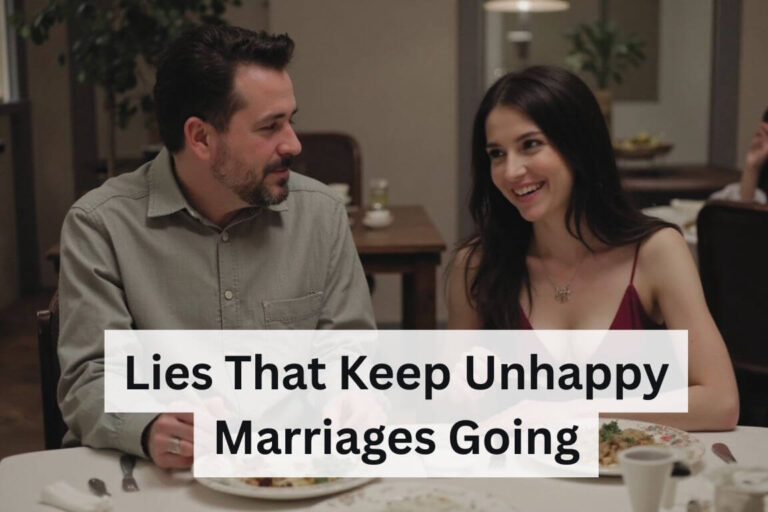Some truths are hard to look at straight on, especially when they live inside the walls of a home we once dreamed would hold nothing but love.
When a marriage starts to feel more like a routine than a relationship, it’s easy to reach for comforting thoughts, little reassurances we tell ourselves to make it through the day.
Over time, these thoughts can become stories, and those stories can slowly turn into lies.
They don’t always come from a place of deception. More often, they come from hope. From fear. From a desire to hold on to something that once felt like everything.
But when we keep repeating these half-truths, we start losing touch with what we actually feel. And that’s when things get stuck, not because the relationship is beyond repair, but because honesty is no longer in the room.
If you’ve ever found yourself whispering one of these lines in your own mind, you’re not alone in that quiet, conflicted space. The real question is: what’s underneath those words?
1. “Every couple goes through this.”
This line gets repeated like a protective charm, as if saying it enough times will make the disconnect feel less heavy. Yes, all relationships have ups and downs, but prolonged distance, silence, or emotional detachment shouldn’t be dismissed as routine.
When the spark is consistently missing and conversations feel more like exchanges of logistics than genuine connection, it’s not just a rough patch. It’s a signal.
Telling yourself that every couple experiences this is a way to normalize discomfort instead of exploring where it’s really coming from. The truth? Not every couple stays stuck.
2. “It’s just a phase.”
Hope can be a beautiful thing, until it turns into denial. Believing that things will “just get better with time” feels easier than confronting the ache that’s been building.
But phases have beginnings and endings. If weeks turn into months and you’re still feeling alone in the same room, it might not be a phase at all. It might be a pattern.
And patterns don’t change on their own. Telling yourself it’s temporary can delay the kind of honesty that leads to real change. Sometimes, facing what hurts is the first step toward healing or clarity.
3. “At least we’re still together.”
Togetherness isn’t always connection. Being under the same roof doesn’t automatically mean you’re still sharing a life. It could just mean you’re sharing space.
This lie sounds noble, even loyal, but beneath it often lies a quiet grief for the closeness that used to be. Staying in a relationship out of habit, fear, or obligation can feel safer than stepping into the unknown.
But clinging to “we’re still here” can mask the fact that the relationship hasn’t truly been alive for a while. Loneliness can exist even in the company of someone who once knew your heart.
4. “We stay for the kids.”
It sounds noble. Selfless, even. But children are far more intuitive than we give them credit for. They can feel the tension behind closed doors, the silence at dinner, the smiles that don’t quite reach the eyes.
Staying together solely for their sake can sometimes send a louder message than separation ever could, that love is supposed to feel cold, distant, or resigned.
Kids don’t just need two parents under one roof. They need to see what healthy connection looks like.
Staying for the kids can become a way of avoiding a deeper fear: what happens if we stop pretending?
5. “I’m probably just being too sensitive.”
When you start questioning your own emotions, it’s often a sign that something’s off. Brushing hurt feelings aside as overreactions is a quiet way of silencing your own needs.
You might not be “too sensitive”, you might just be under-nurtured. Constantly second-guessing yourself can become a coping mechanism to avoid hard conversations or to justify why affection feels out of reach.
Sensitivity isn’t the issue, emotional neglect is. And minimizing your experience only deepens the loneliness. The truth? Your feelings are trying to tell you something real.

6. “No one has it all in marriage.”
There’s a difference between embracing imperfection and settling for emotional emptiness. It’s true. No relationship checks every box all the time.
But when this line becomes a blanket excuse for years of disconnection, resentment, or unmet needs, it stops being realistic and starts becoming self-sabotage. You can accept flaws without ignoring your heart.
elling yourself that nobody has it all might sound wise, but underneath it often lives a quiet resignation, the kind that slowly dulls the light in your eyes. You deserve more than just “tolerable.”
7. “Things aren’t that bad.”
It’s easy to measure your relationship against the worst-case scenarios, yelling matches, betrayal, full-blown chaos, and think, “Well, at least it’s not like that.”
But comparison can be a dangerous comfort. Just because things aren’t loud or explosive doesn’t mean they’re healthy. Quiet disconnection can be just as damaging as open conflict.
When the bar is set at “not the worst,” it leaves very little room for joy, for growth, or for emotional safety. “Not that bad” shouldn’t be the standard. You’re allowed to want more than just not terrible.
8. “They’re just stressed lately.”
We all have seasons of stress, work deadlines, family pressure, financial uncertainty. But when stress becomes the default explanation for ongoing distance, something deeper may be going unnoticed.
If emotional absence, irritability, or withdrawal have become patterns, it’s worth asking: Is it really stress… or is it disconnection hiding in plain sight?
Blaming the external can feel safer than facing the internal. But true connection requires being seen through the hard seasons, not just waiting them out in silence.
9. “We’ve been through worse.”
Surviving past storms doesn’t automatically mean the sky is clear now. In fact, sometimes that shared history becomes a reason to avoid admitting when things no longer feel right.
Saying “we’ve been through worse” can minimize the very real pain of the present. It turns survival into a badge and leaves no room to question if you’re still truly living together, or just lasting.
Longevity isn’t always a sign of health, sometimes it’s a sign of endurance. And while endurance is admirable, connection is essential.
10. “Maybe I’m the problem.”
When something feels off, it’s tempting to turn inward and wonder, “Is it just me?” Self-reflection can be healthy, but self-blame is a different story.
This lie keeps you stuck, convincing you that your needs are unreasonable or your emotions are overreactions. It’s easier to question yourself than to ask your partner to show up differently. But relationships aren’t one-person puzzles.
If you’re constantly carrying the emotional weight alone, it’s worth asking whether your partner is willing to meet you halfway, not whether you should shrink to make the dynamic work.
11. “At least they don’t cheat/hit/yell.”
When the bar is set at “not harmful,” it can cloud the reality that the relationship might still be deeply unfulfilling. Just because someone isn’t abusive doesn’t mean they’re emotionally present, kind, or supportive.
Absence isn’t the same as peace. Minimizing your pain by comparing it to worse-case scenarios doesn’t make the ache go away. It just makes you question if you’re allowed to feel it.
You don’t need a crisis to justify wanting more. A relationship should nurture, not just avoid harm.
12. “Love changes, right?”
Yes, love evolves, but it shouldn’t vanish. The mistake here is confusing emotional drift with emotional maturity. It’s true that passion shifts into deeper forms of connection, but when love feels like absence, indifference, or duty, that’s not evolution, that’s erosion.
This lie masks discomfort by pretending it’s natural. But the quiet between two people shouldn’t feel hollow. Love can soften over time, sure, but it should still feel alive. Change doesn’t mean disconnection.
13. “We’re just not romantic anymore, that’s normal.”
Life gets busy. Routines set in. But when romance disappears entirely, it often takes intimacy, curiosity, and joy with it.
Saying it’s “normal” becomes a way of accepting the drift instead of resisting it. Romance doesn’t have to look like grand gestures. It’s the small signals of affection, the way you make each other feel chosen, even after all this time.
Letting go of romance as a lost cause is one of the quietest ways a relationship fades. It doesn’t have to be like this, if you’re both still willing to reach.


